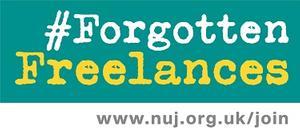Report finds #ForgottenFreelances were let down by Treasury and HMRC
The National Audit Office says government schemes fell short of helping many freelances and the scale of fraud and error could be considerable, particularly for the furlough scheme.

© red engine
The Treasury and HM Revenue & Customs (HMRC) could have done more to prevent many NUJ freelances falling through the cracks in the government's Covid-19 aid schemes, according to a report by the National Audit Office (NAO).
The NAO says they need to ensure the necessary information is available to cover as many people as possible, so that fewer people suffer loss of income by being excluded from similar schemes in the future. The report found that almost one in four (23 per cent) of those potentially eligible for the scheme missed out.
As many as 2.9 million people were not eligible for the schemes, either because of ministerial decisions about where to focus support or because HMRC said it did not have data needed to properly guard against the risk of fraud.
Pamela Morton, NUJ national freelance organiser, said:
"We just do not accept that HMRC did not have the data, or that there was the risk of fraud. HMRC would have had the information about the many individuals who are paid via PAYE, yet are not employees, as well as those who have less than 50 per cent self-assessed income.
"There was no need for a cliff edge. Those running limited companies could have been helped based on their tax returns which could easily have been checked. The same cap of £2,500 could have applied to those with more than £50,000 in profits as applied to employees under the Coronavirus Job Retention Scheme.
"The government has put the misplaced fear of possible fraud above providing support for everyone fairly."
The National Audit Office report said:
"The Self-Employed Income Support Scheme (SEISS) supported at least 2.6 million self-employed, around 77 per cent of the 3.4 million people potentially eligible for the scheme… As many as 2.9 million people were not eligible for the schemes, either because of ministerial decisions about where to focus support, or because HMRC did not have data needed to properly guard against the risk of fraud.
"This includes 1.1 million people estimated by third parties to be ineligible for the Coronavirus Job Retention Scheme (CJS) because HMRC had limited data to validate claims or determine eligibility.
"HMRC estimates that around 1.6 million self-employed people did not meet the criteria for SEISS, for example because most of their income did not come from being self-employed (1.4 million people) or their trading profits exceeded £50,000 (200,000 people). Third parties estimate that a further 200,000 were ineligible for SEISS because they were newly self-employed in 2019-20 and had not yet submitted a self-assessment return."
The report also noted the CJS was open to fraud, with some employers making their staff work during furloughs or not passing on payments in full. HMRC now intends to publish the names of employers claiming the new Job Support Scheme and to notify employees through their personal tax accounts when an employer has claimed under this scheme.
